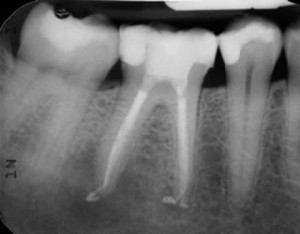Caring For Teeth Restored By Root Canal Treatment
Appropriate care after this tooth-saving procedure
 Hopefully, our readers won’t just see the words ‘root canal’ in the title of today’s blog and move on quickly to something else. Whilst there is little doubt that this particular procedure can invoke fear in many dental patients, there is no real reason for this to be the case in the modern world.
Hopefully, our readers won’t just see the words ‘root canal’ in the title of today’s blog and move on quickly to something else. Whilst there is little doubt that this particular procedure can invoke fear in many dental patients, there is no real reason for this to be the case in the modern world.
Procedural techniques have improved, and with x-rays being used beforehand, there is minimal risk of carrying out the treatment where an abscess is present; something which it is thought to have given the procedure its historical reputation for pain!
We have discussed the actual root canal procedure in previous blogs and thought that today, we would take a look at what our Ipswich patients need to do to maintain a tooth that has been treated in this way. Although a tooth restored in this way is able to function relatively normally, there are some things that patients should be aware of.
The effect of root canal treatment on a tooth
This treatment is carried out when the soft pulp in the root canals of the tooth becomes infected. This ‘pulp’ contains not only tiny blood vessels, but also the nerves of the tooth. It is this factor that means the tooth requires a little extra care afterwards. The following is what we advise patients of the Foxhall Dental Practice who have received this treatment.
General cleaning
The most important thing that we should state is that although the nerves of the tooth have gone, this doesn’t mean that you don’t need to clean the tooth. In fact, you should take extra care to keep it clean. This includes regular brushing and also flossing around the tooth. You might not get toothache anymore if you don’t, but there are two significant risks to your oral health if you neglect this. Firstly, the enamel needs to be kept as healthy as possible. A root canal treated tooth is slightly weaker than a healthy natural tooth and you should therefore keep the enamel as strong and healthy as you possibly can. Also, as a crown will have been fitted to complete the root canal procedure, if the enamel starts to deteriorate, your crown may become unstable and come away from the tooth.
Secondly, and something which applies to all of your teeth, is the possibility of gum disease. This is more common in people who don’t brush their gums as well as their teeth. As food gets trapped between the tooth and the gum, it is important that you angle your toothbrush so that these areas are cleaned. Floss should also be used to remove food that has become trapped between the teeth. Remember, gum disease not only has some unpleasant symptoms such as bad breath but can also result in loose teeth or even tooth loss.
Care when eating
The other thing to remember following this treatment is that whilst your treated tooth will retain sufficient strength for everyday use, it will not be as strong as a healthy natural tooth and you should keep this in mind when you are eating. Avoid using the treated tooth when biting on harder foods. In addition to not being as strong as a healthy tooth, it also has no nerves in it and this means that it can be hard to judge exactly how much pressure you are using when you bite into something. The combination of these two factors means that damage could occur to the tooth if you don’t take sufficient care.
It might sound as though it isn’t worth undergoing this treatment, but the fact is that it is currently the only way to save a tooth that has become infected in this way. The only other alternative is to have the tooth extracted and a dental implant or similar placed instead. Whilst this might be something to consider in the future, the reality is that a root canal treated tooth can function well, with a little care, and should be expected to last a long time if you take care of it correctly.
We acknowledge that some patients of our popular Ipswich clinic might have some concerns about this treatment, given its unwarranted reputation. We are always happy to talk you through the procedure and explain what it entails. X rays are also routinely taken before the procedure and the local anaesthetic used ensures that any discomfort will be minimised.
Whether for root canal therapy or any other dental treatment, we are sure that you will find our team to be both experienced and friendly and will help you overcome any anxiety you might feel about your visit with us.
To book an appointment with a member of our team, please call the Foxhall Dental Practice today on 01473 258396.
